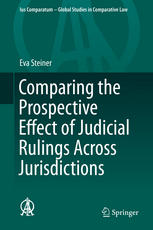

Most ebook files are in PDF format, so you can easily read them using various software such as Foxit Reader or directly on the Google Chrome browser.
Some ebook files are released by publishers in other formats such as .awz, .mobi, .epub, .fb2, etc. You may need to install specific software to read these formats on mobile/PC, such as Calibre.
Please read the tutorial at this link: https://ebookbell.com/faq
We offer FREE conversion to the popular formats you request; however, this may take some time. Therefore, right after payment, please email us, and we will try to provide the service as quickly as possible.
For some exceptional file formats or broken links (if any), please refrain from opening any disputes. Instead, email us first, and we will try to assist within a maximum of 6 hours.
EbookBell Team

4.8
34 reviewsThis work deals with the temporal effect of judicial decisions and more specifically, with the hardship caused by the retroactive operation of overruling decisions. By means of a jurisprudential and comparative analysis, the book explores several issues created by the overruling of earlier decisions.
Overruling of earlier decisions, when it occurs, operates retrospectively with the effect that it infringes the principle of legal certainty through upsetting any previous arrangements made by a party to a case under long standing precedents established previously by the courts. On this account, in the recent past, a number of jurisdictions have had to deal with the prospect of introducing in their own systems the well-established US practice of prospective overruling whereby the court may announce in advance that it will change the relevant rule or interpretation of the rule but only for future cases. However, adopting prospective overruling raises a series of issues mainly related to the constitutional limits of the judicial function coupled by the practical difficulties attendant upon such a practice. This book answers a number of the questions raised by this practice. It makes use of the great reservoir of foreign legal experience that furnishes theoretical and practical ideas from which national judges may draw their knowledge and inspiration in order to be able to advise a rational method of dealing with time when they give their decisions.